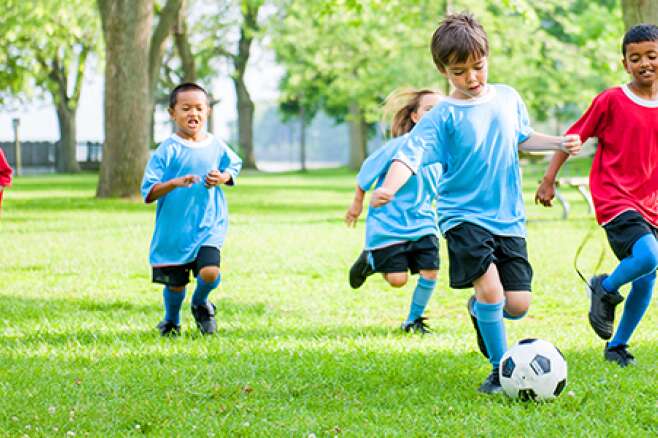Kids Soccer
In the age that we live in, technology has taken a center stage. There is a tendency among kids to get addicted to TV, ipads and video games. The result is too much screen time and no exercise. Therefore, it is all the more important for your kids to make a physical sport part of their daily routine. Soccer is not only good fun, but it also keeps children physically fit and teaches them other skills as well. We all know healthy habits learned at a young age last forever so why not provide them with healthy sports activities that can benefit them all their life. This is where soccer comes in!
Soccer is gaining popularity all over the world because it is very enjoyable, easy to play and hardly requires any equipment. It is a favorite hobby among young teenagers and for kids it is a very healthy sport to get into. You get to learn motor skills, develop physical strength and teach kids about self-discipline and team play.
You can get your kids started with soccer at an early age, this can be as early as age 4 or 5. The introduction to soccer can be made with a simple ball. The idea here is to focus on fun and make them simply enjoy the ball. Get an attractive or a colorful ball with maybe their favorite character on it. Initially, just have them kick around the ball and slowly start teaching them basic movements. It is also a good idea to make them watch soccer so they get to know how the sport is actually played. This will help them understand the aim of the game.
From your playground you can start taking your kid to the nearby park and involve more players. Kids can practice basic soccer drills like shooting, kicking, passing and dribbling. Gradually teach them the game rules and about discipling themselves to score a goal within a set time frame.
At a more mature level, kids can either join a league or an after-school club to be trained better. In a more structured environment, they can learn about different roles of the player. They will learn which role they feel more comfortable with. The offensive team includes the strikers or forwards on whom the team relies to score. The defensive team, as evident by the term, protects the team’s goals by taking the ball from the other team. We all are familiar with the role of the goalkeeper who has to be the most vigilant and protect the other team from making any goal. Some players play both offense and defense and it takes time to discover which role suits you. Kids should therefore make sure to play at every position to explore their potential in these different roles.
Along with the sport, it is also crucial to teach children how to develop a good attitude. Give them constructive feedback so they can work on their weaknesses and focus on their strengths. They should know how to play as a team and encourage others and not ridicule fellow players. The most important point is that they must be able to take defeat gracefully and learn from their mistakes rather than sulking. It is a game in the end and winning or losing is not that important because you will go through both. What is important is having the right attitude in all scenarios.

